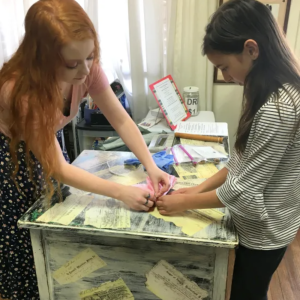Museum Studies & Public History







Museum Studies & Public History
The Museum Studies & Public History minor includes three components.
1) An introductory-level methods and approaches course,
2) Disciplinary elective courses from a variety of majors and minors in which aspects of Museum Studies and Public History are included. NOTE: These must be from two different prefixes (ARH and GEO, for example, or GIS and HST) and at least one course must be at the 3000-4000 level.
3) A capstone experience consisting of a significant project or internship in the student’s area of interest. 
When Art History joined the Department of History and Geography in the Spring of 2019, one of the many commonalities considered was our and our students’ shared interests in museum studies as an extension of public-facing work. In fact, one of the first joint meetings of our new department was dedicated to thinking about the possibility of this minor. Two years on, the department has grown by three new faculty members, each of whom is engaged in methods and approaches connected to public history. As we discussed what such a minor would look like, student interest in the possibility grew. A recent double major in History and Art History (’20) is beginning an MA in Public History at NC State University this Fall. Another double major (’21) entered is enrolled in the MA program in Art History and Museum Studies at American University. This student is also the first Elon student to benefit from a scholarship to American University that sets aside $15,000 to support an Elon graduate who wants to complete a MA in Art History at American, a program well-known for its track in Museum Studies.
The Museum Studies and Public History minor introduces students to careers in Museum Studies and Public History, but it also encourages deeper thinking about expanded audiences and more engaged publics. It expands student writing to include an emphasis on technical and communication skills and creates the possibility of a new cohort of students across programs housed in and outside our department.
Where are Elon alumni working?
- Director of Education, Maine Maritime Museum
- Director of Visitor Services, Discovery Museum, Acton Massachusetts.
- Public Events and Youth Programs Coordinator at The Children’s Museum of Indianapolis
- Cataloger, Phillips Auctioneers
- Registrar, George Washington’s Mount Vernon
- Installation Management Specialist, Ft. Sill, Oklahoma
- Collections Manager at Museum of Aviation, Warner Robins, Georgia.
Look for more Elon Museum & Public History connections on LinkedIn.
MSPH Goals & Student Learning Outcomes
Goal 1: Demonstrate a critical awareness of the role of museums, monuments, archives, and other institutions in shaping understandings of history, culture, and identity.
- Student Learning Outcome 1.1: Analyze the benefits and limitations of various ways the general public learns about and encounters narratives about the past and present through venues such as exhibits, symbols, media, art, monuments, or memorials.
- Student Learning Outcome 1.2: Identify debates, opportunities, challenges, and ethical issues related to whose stories are preserved and/or shared with the public, with what values and assumptions, and in what ways, in order to communicate complex and accurate ideas with the public.
Goal 2: Be prepared for graduate and professional work in museum studies, public history, and related fields.
- Student Learning Outcome 2.1: Articulate methods, approaches, and processes used in museum studies and public history.
- Student Learning Outcome 2.2: Identify career opportunities that connect to museum studies and public history.
Goal 3: Engage in the practice of museum studies/public history and/or apply the knowledge and skills learned in practical projects of public historical story-telling, exhibitions, or other public cultural projects.
- Student Learning Outcome 3.1: Conceptualize, plan, or execute a project that demonstrates an understanding of research methods, theory, and technical skills.
- Student Learning Outcome 3.2: Integrate research skills with public writing and presentations.
- Student Learning Outcome 3.3: Learn to design and implement public exhibitions.